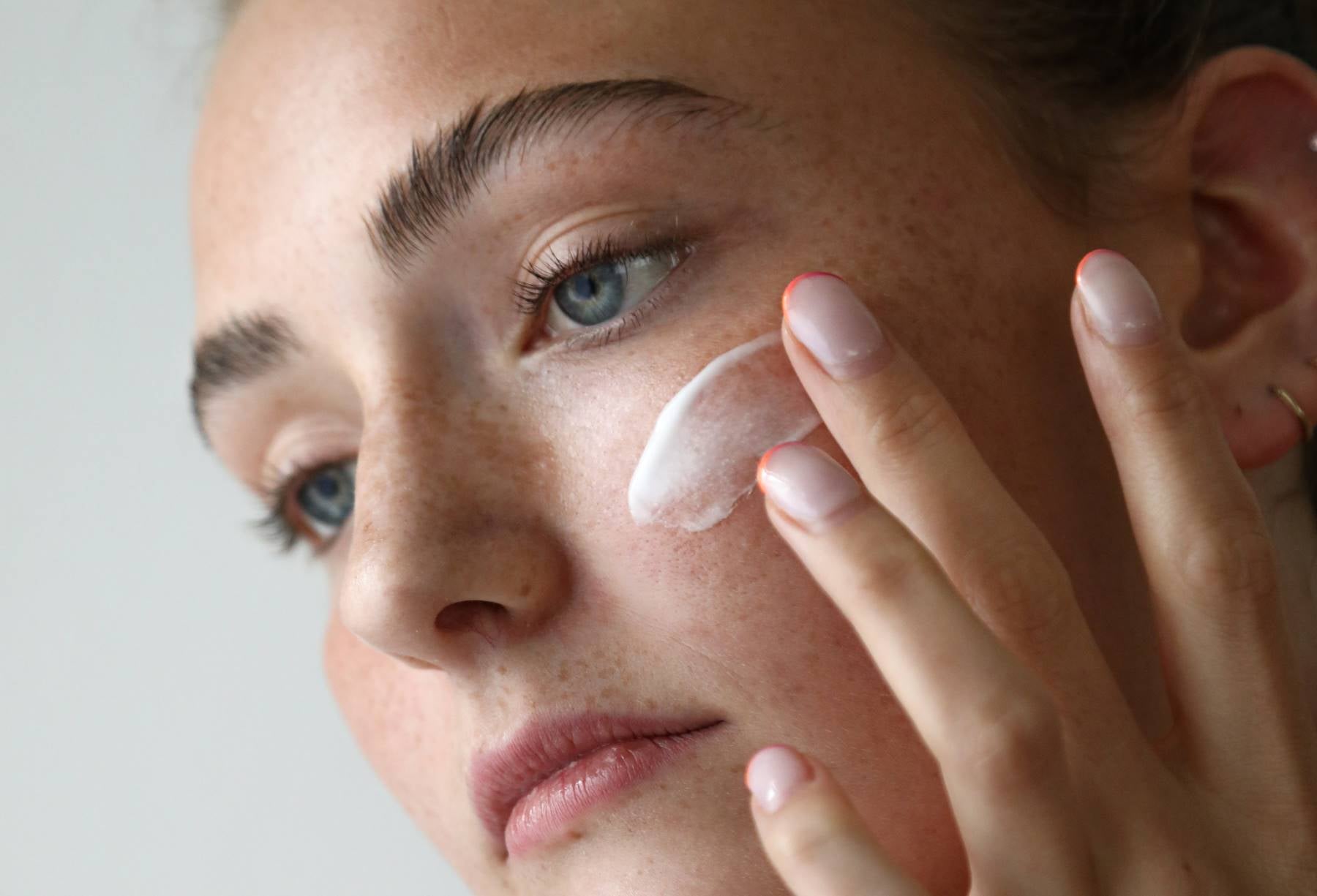
What Is Skin pH?
Our skin is a complex, multi-layered organ that is constantly working to protect us. One of the ways it does this is with pH. But what is skin pH and why is it important? Read on to learn how your skin pH is linked to skin health and what you can do to keep it balanced.
Our body’s first layer of defense, our skin, is constantly challenged by external aggressors. From pollution and UV light to harsh chemicals and climate fluctuations, our skin’s protective barrier is always working to balance itself and remain healthy and resilient. One of its protective mechanisms is skin pH.
What is skin pH?
pH stands for “potential hydrogen” and refers to a scale from 0 to 14 that measures acidity. Pure water has a neutral or balanced pH of 7. For human skin, the optimal pH level is between 4.7 and 5.75. Acidity levels vary across the body, with more exposed areas tending to be more alkaline. Average adult skin is mildly acidic, with a pH of 5.7. A pH level below 7 means skin is too acidic, while a pH level above 7 means skin is too alkaline.
A balanced skin pH is slightly acidic and supports a healthy acid mantle: the watery part of our skin’s hydrolipid film, which covers our skin’s outermost layer, the epidermis. The skin’s acid mantle is what creates the right environment for skin-friendly microorganisms to thrive and for proper cell turnover to occur. The acid mantle is also what prevents water loss and protects us from harmful aggressors, free radicals and bacteria, helping our skin remain balanced, healthy and youthful.
Why is skin pH important?
Skin pH is related to sebum production. Sebum is your skin’s natural moisturizer, keeping it protected and hydrated. Skin that does not produce enough sebum has high pH levels (alkaline). Skin that produces too much sebum has low pH levels (acidic). Knowing where your skin is on the pH scale will help you select the right products to keep it balanced. When skin pH becomes too alkaline, it can become red, dry, inelastic, tight or flaky. When skin pH becomes too acidic, skin can become oily, inflamed, irritated or develop acne. People with a dry skin type often have alkaline skin with a high pH level, while people with an oily skin type often have acidic skin with a low pH level.
When we are born, our skin starts off with an alkaline pH as our protective acid mantle is not yet fully formed. As we grow older and experience hormonal changes, our skin pH turns more acidic. As our skin naturally ages with time, its structure and protective functions start to weaken. Its natural capacity for collagen, elastin and sebum production slows down and the signs of aging become more visible. Fine lines and wrinkles start to form, changes in tone and texture may appear, and skin loses elasticity and firmness. An imbalanced skin pH will weaken the acid mantle and skin may become less resilient and more susceptible to environmental aggressors, dryness, infections or irritability. Paying attention to how our skin pH may change with age helps us make better skincare choices.
What can affect skin pH levels?
Our skin is a living, dynamic organ that is constantly fluctuating and changing. Likewise, skin pH is also in flux, and can change based on genes, environment and lifestyle.
Internal factors that affect skin pH include:
- genetics
- age
- hormonal changes or imbalances
Many external factors affect our skin’s pH. Such factors include:
- dirt and pollution
- seasonal changes in temperature and humidity
- harsh chemicals or skincare products
- sweat and sebum production
- overexposure to UV rays and blue light
- eating habits
Skin pH shares a bilateral relationship with both skin type and skin conditions. Compromised or damaged skin pH can affect skin type, which can change during a person’s lifetime. Likewise, unbalanced skin pH levels can sometimes cause skin conditions such as acne, eczema or rosacea. Reversely, some skin conditions can alter a person’s skin pH, so paying attention to what your skin is telling you is important.
How to care for your skin pH
Maintaining the correct pH balance is essential for minimizing the effects of natural aging, skin conditions or common skin problems. When pH is out of balance, your skin’s defense mechanism is compromised, leaving your skin susceptible to potential infections, bacteria or germs, and with a slower healing capacity.
Avoid harsh chemicals
Antibacterial chemicals often found in cleansing products and soaps can disrupt your skin’s micro-flora that help regulate skin pH. To prevent disrupting your skin pH, avoid products that contain harsh chemicals and toxins and opt for gentle face cleansers instead. Ideally look for products that match your skin pH, and that contain botanical or natural products rich in minerals, vitamins and antioxidants. If your skin type allows it, a toner can also help re-calibrate your skin pH after cleansing.
For refreshing exfoliation that softens and rejuvenates the skin, use ChitoCare beauty Body Scrub. Bamboo and walnut micro-granules gently clears away dead skin cells, while marine chitosan covers the skin in a soothing, protective film.
Moisturize, moisturize, moisturize
A vital component of healthy skin is ensuring it remains sufficiently hydrated and moisturized. Well hydrated skin means your skin’s barrier functions remains resilient, and slightly acidic. Apply moisturizer that suits your skin type and pH every day after cleansing to maintain soft, supple skin. Remember to wash your face with lukewarm water, as hot water can strip your skin of necessary lipids, causing irritation, tightness, flakiness or dryness.
For bright, moisturized skin, apply ChitoCare beauty Face Cream, every morning and night. Containing anti-aging soybean oil and hydrating macadamia oil, it helps moisture retention, while marine chitosan supports the skin’s natural repair process.
Protect your skin from the sun
Sun damage is the primary cause of premature skin aging. Overexposure to UV light can compromise your skin barrier, resulting in a disrupted pH, water loss, inflammation or sensitivity. Always wear a sunscreen with a SPF (Sun Protection Factor) of at least 30, even in winter or on overcast days as UVA rays diffuse through clouds and windows.
To relieve sunburned skin and promote natural skin healing, apply ChitoCare medical Healing Spray, a topical spray for irritated or damaged skin. Suitable for all skin types, it soothes and protects, reducing redness, itching and pain.
Improve your diet
Maintaining a healthy diet is good for every part of your body, including your skin. Add the benefits of a diet rich in nutrients, antioxidants and minerals to your skin care routine, to maintain correct pH levels. Avoiding processed foods or foods high in saturated fats and GMOs will help your oil-to-water content remain balanced, while drinking lots of water will help flush out toxins.
Supplement your diet with a natural blend of nourishing ingredients with ChitoCare beauty Hair, Skin & Nails. Containing antioxidant selenium and Vitamin C, it boosts your skin’s natural barrier function. To treat your skin to antioxidants topically, apply ChitoCare beauty Body Lotion, rich in antioxidant Vitamin E, aloe vera and coconut oil.
___
If you are unsure of your skin type or want to know what skin pH you have, you can speak with a dermatologist. They can help determine your skin type and pH and offer skincare advice that suits your personal needs.


